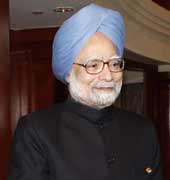|
Beijing: Prime minister Manmohan Singh has called for massive injection of liquidity by multilateral lending agencies in developing economies to stave off threats of a global recession and bring about sustained growth.  Addressing the opening session of the seventh Asia Europe Meeting in Beijing, he said the real economies of developing countries like India continue to grow even as they feel the pangs of the financial market meltdown elsewhere. Addressing the opening session of the seventh Asia Europe Meeting in Beijing, he said the real economies of developing countries like India continue to grow even as they feel the pangs of the financial market meltdown elsewhere.
He said active development of developing countries through injection of massive funds by multilateral agencies, especially in the infrastructural sectors, can help stave off of a global recession. ''This can be a counter-cyclical device and act as a powerful stabiliser,'' Singh told representatives from 45 countries at a working dinner on the opening day of the Asia and Europe Meeting. He said the crisis of confidence in the western financial system is spilling over to the global markets and the real economy, adversely affecting developing countries. He cited India's case where the annual GDP growth rate has declined from an average 9 per cent to 7-7.5 per cent levels.
''Our stock markets and the exchange rate of the rupee are under pressure due to capital outflow of foreign institutional investors (FIIs),'' as the global slowdown affects export demand and capital inflows, the prime minister said. ''The IMF and the World Bank should put in place facilities to provide additional assistance more quickly and in large amounts with less service conditions and greater flexibility to developing countries," he said. He blamed the current crisis to a massive failure of the regulatory and supervisory system and financial engineering without supporting regulatory infrastructure. "Massive failure of regulatory and supervisory mechanism has really been the reason for the present turmoil and if there had been a good regulatory mechanism, this would not have happened," he added. Pointing to the ''economically damaging role of excessive speculative activity,'' Singh said any international agenda to reform the international financial system would have to take on board the effects of ''casino capitalism'' on real economy. He also cited John Maynard Keynes' dictum that speculators did no harm as bubbles on a steady stream of enterprise. ''But the position is serious when enterprise becomes the bubble on a whirlpool of speculation. When the capital development of a country becomes a byproduct of the activities of a casino, the job is likely to be ill-done.'' Speaking a day after French president Nicolas Sarkozy appealed to Asia to stand firmly with Europe in pushing for fundamental reforms in the international financial system and the international credit agencies, the prime minister also called for a radical overhaul of the Bretton Woods system. Blaming the present crisis on the failure of risk management in private financial institutions and a lack of market discipline, Singh said ''the sad truth is that in this age of globalisation we have a global economy of sorts but it is not supported by a global polity to provide effective governance.'' The prime minister supported a coordinated global action for declogging of credit markets and said the International Monetary Fund and World Bank should provide assistance to vulnerable countries ''with less service conditionalities and greater flexibility.'' He said countries with strong foreign exchange positions could make additional resources available to the international financial institutions. Alternatively, the IMF should consider creating liquidity through a fresh allocation of Special Drawing Rights (SDRs) in favour of multilateral development finance institutions, he said.
While sustainable development is the buzz word, it is among the biggest challenges of our times and needs a lot of cooperative work to transform it into an operational strategy for development. ''The development strategies that we adopt have to result in a fair, equitable and balanced distribution of the economic dividend. At the same time, it must also preserve and protect the environment. Only then can we make faster progress in meeting the Millennium Development Goals,'' he said. There is a need to put in place a global action plan to promote both food and energy security for managing the challenges of both accelerated growth and its environmental sustainability, he said. Singh also called for action on the technology transfer and climate action fronts. Concerted action is needed on the poverty alleviation front as well, he said. ''The challenge ahead is to put in place development strategies which improve living standards, create opportunities for job creation and are also environment friendly,'' he said, adding, the world therefore needs a new compact to increase efficiency in the use of available energy resources. Without peace there can be no sustainable development. Terrorism, extremism, and intolerance threaten our social cohesion. We need to continuously strengthen international cooperation to combat terrorism. We must bring perpetrators, organizers, financiers and sponsors of terrorism to justice, he remarked. Finally, globalisation, if it is to succeed, must be fair and benefit the whole of humanity. Development has to be inclusive. It must reduce disparities of income and wealth. It should create ever widening circles of stake-holders. It should respect pluralism and diversity, he added.
|